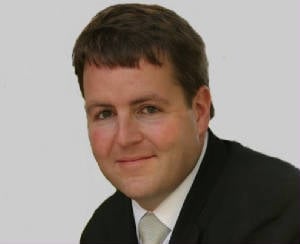Since I was supposed to meet Ryan Howes today at a psychotherapy convention in DC but couldn’t because I’m in Norfolk, VA meeting all the new owners of Beliefnet, I thought I’d publish my interview with him from awhile back. I guess I should say he blurbed my book, because I got in trouble recently for posting someone’s work without saying the person endorsed my book. Politics. I’ve never been all that good at that.

Today I have the honor of interviewing Ryan Howes, a clinical psychologist and college professor who blogs for “Psychology Today.” Howes earned his masters degree in theology and PhD in clinical psychology from Fuller Theological Seminary, where he studied spirituality, men’s issues and psychodynamic therapy. He teaches graduate students at Pepperdine University and Fuller and is co-author of “What Wives Wish their Husbands Knew About Sex: A Guide for Christian Men” (Baker Books, 2007), which has been called the funniest, most irreverent Christian sex manual since . . . well, a long time anyway. He maintains a private practice in Pasadena, California.
Last year he created the Psychology Today blog In Therapy: A User’s Guide to Psychotherapy where he addresses problems often experienced but rarely written about, such as the role of small talk in therapy, why therapists don’t like giving advice and something called “therapy constipation.” In order to flesh out differences between types of therapy, he asked the field’s top authors, theorists and policymakers seven basic questions about their work. This Seven Questions Project illuminates both the personality and the technique of the writers, making interesting reading for clients and therapists alike.
Question: You’ve interviewed such a range of clinicians — and so many authors and psychotherapists that I reference everyday in my personal struggles and in my work. Were there any prevalent themes that emerged from the seven questions? Were you surprised to see some common territory where you thought there would be no overlap?
Dr. Howes: I selected therapists who represent a variety of theories and specialties. They definitely showcased their unique personalities and techniques, but most held similar views on the fundamentals of psychotherapy. Some common themes from the interviews:
The relationship: Research shows the therapeutic relationship is the most important factor for successful therapy, and my respondents know it. Everyone from Judith Beck to Harriet Lerner to John Gray agree a good therapeutic alliance is essential – and if clients don’t have it early on they should look elsewhere.
Therapist self-care: Nearly everyone pointed out how stressful this work can be. Therapists need to maintain strong boundaries, get their own therapy and know their limitations. Or find a new job.
Mudslinging: This collection of caring professionals sure can dish it out. The dynamic types criticized the cognitive therapists for being too superficial, the cognitive types criticized the dynamic therapists for wasting time on that childhood hullabaloo. David Burns knocked mainstream therapy in general (he even slammed my questions!) and Thomas Szasz panned the entire mental health field, but that’s what he does.
Question: Which is your favorite psychologist? Just kidding. In your work
with patients, which books do you pull out the most?
Dr. Howes: Actually, I do have a favorite: Irvin Yalom has been a mentor since I attended my first graduate school class (unbeknownst to him). “Love’s Executioner” was required reading and its fascinating case studies had me hooked. His therapeutic skill and the honest humanity in his writing continue to impact me personally and professionally. Sitting in his office interviewing him for this project was a career highlight.
Yalom is on my bookshelf for my edification. For my clients, I’d say the books most often recommended are “The Road Less Travelled” by M. Scott Peck, “Boundaries” by Cloud and Townsend, “Being and Loving” by Althea Horner, “Getting the Love You Want” by Harville Hendrix and “Healing the Shame that Binds You” by John Bradshaw. And pre-orders of “Beyond Blue,” of course. If all therapists read Yalom’s collected works and clients read the above titles, the world would be a better place.
Question: You mention that spirituality is an area of your expertise. I’m glad to hear that, of course, because my faith is very important to my recovery. But some folks find anything remotely religious to be repugnant. How do you know which patients will be receptive to some
God talk?
Dr. Howes: I know that many, many people have shut down spiritually because they’ve been burned by religion. But I see religion as humanity’s imperfect attempt to reach the divine, while spirituality is a natural facet of everyone; whether it’s experienced in front of an altar, a walk in the woods or during a particularly inspiring Tweet.
I ask every client about the resources they bring to therapy including their social network, knowledge base, physical health, emotional resilience and spiritual life. If spirituality is something they’d like to examine a little deeper, I’m all for it.
* Click here to subscribe to Beyond Blue and click here to follow Therese on Twitter and click here to join Group Beyond Blue, a depression support group. Now stop clicking.

